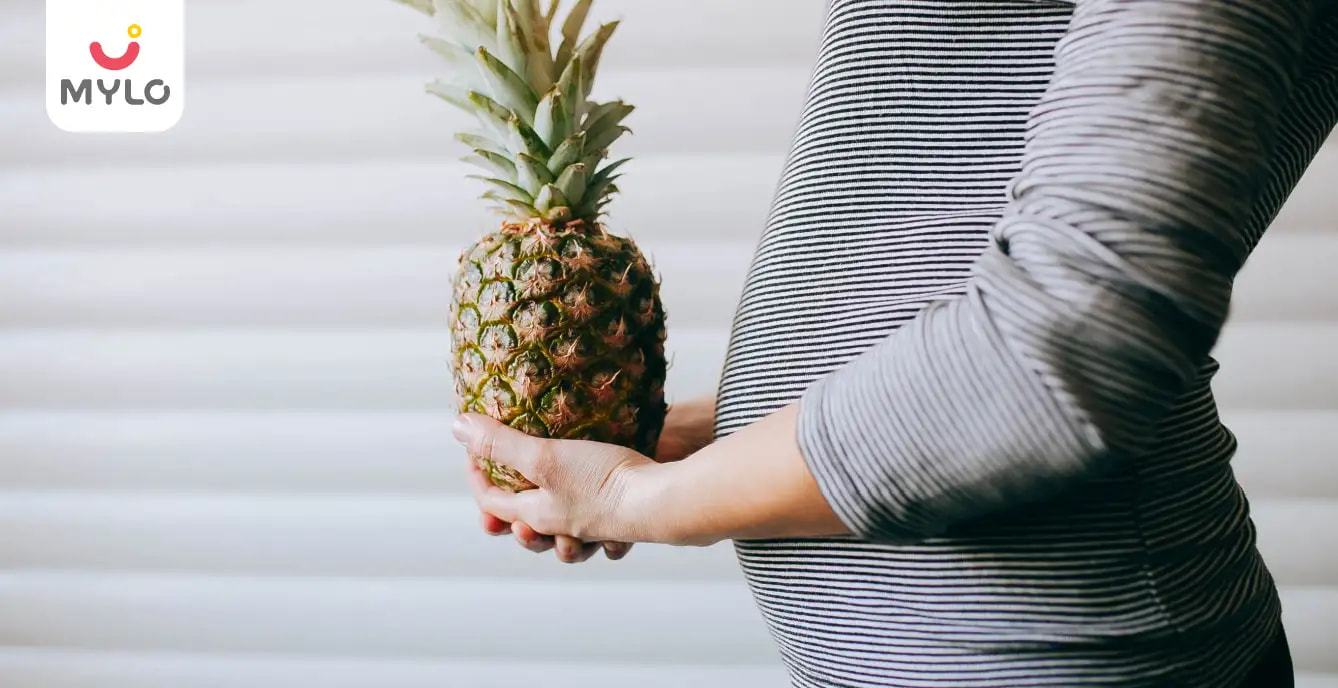- Home

- Pregnancy Journey

- Pineapple in Pregnancy: Benefits, Risks and Precautions
In this Article
Pregnancy Journey
Pineapple in Pregnancy: Benefits, Risks and Precautions
Updated on 3 November 2023



Medically Reviewed by
Shwetha
Weight Loss, Diabetes - MSc in Food Science & Nutrition
View Profile

Pineapple is a delicious and nutritious tropical fruit that is enjoyed by many around the world. However, many women may be concerned about consuming pineapple in pregnancy due to its potential risks and benefits. While pineapple is a rich source of vitamins, minerals, and antioxidants that can provide numerous health benefits during pregnancy, it also contains bromelain, an enzyme that can cause uterine contractions and potentially lead to miscarriage.
In this article, we will explore the potential benefits and risks of consuming pineapple during pregnancy and provide some tips on how to safely incorporate it into your diet.
Are Pineapples a Labour Inducer?
Most pregnant ladies go into labour once they pass the 40 weeks mark on their own, but it can be tempting to try labour-inducing remedies if the pregnancy has passed over 40 weeks. And eating pineapples during pregnancy is just one of them. While women are often recommended to avoid eating pineapple during pregnancy first trimester, this changes when women enter late into pregnancy and are awaiting labour. This is so because it is a common belief that eating pineapple can loosen the cervix and induce contractions and labour.
There is some evidence to suggest that pineapples, specifically the core, may contain an enzyme called bromelain that can ripen the cervix and cause contractions, potentially leading to labour. However, there is very little scientific proof to support this claim, and in some cases, consuming pineapple can lead to gastric upset which may leave expectant mothers exhausted and possibly dehydrated. It is also important to note that natural remedies are unlikely to work before 37 or 38 weeks of pregnancy, and every baby is unique and may need the full 40 weeks or more to be at their healthiest.
This raises the question, is pineapple good for pregnancy. So, let usunderstand can pregnant women eat pineapple and if yes, then what are its benefits.
Can We Eat Pineapple During Pregnancy?
With so many myths surrounding pineapples during pregnancy, it's normal for pregnant women to wonder if it's safe to eat or not. As long as women avoid eating pineapple during pregnancy first trimester and consume it moderately in the following two trimesters, there's no harm in eating pineapple. But overconsumption of pineapple can lead to certain side effects, which may even affect pregnancy outcomes.
When it comes to pineapple juice during pregnancy, it is also considered safe to consume like fresh pineapples. Pineapple juice can be a refreshing and nutritious addition to your pregnancy diet. It is rich in vitamins and minerals, including vitamin C, folate, iron, magnesium, manganese, copper, and vitamin B-6, which are beneficial for both you and your baby's health. However, it's always a good idea to consult with your doctor or healthcare provider before making any changes to your diet during pregnancy.
Benefits of Pineapple in Pregnancy
Consuming pineapples during pregnancy can provide several benefits including:
1. Provides vitamin C
Pineapple is a good source of vitamin C, which helps with the absorption of iron and supports the immune system. Additionally, vitamin C is an antioxidant that can help reduce inflammation and fight free radicals in the body.
2. Supports fetal development
Pineapple also contains folate. A pregnant lady should consume at least 600 mcg of folate per day to keep the baby's health on track. Single-cup of pineapple can give 30 mcg of folate, which is essential for fetal development and helps prevent birth defects.
3. Prevents pregnancy complications
Pineapple also contains magnesium, which can help prevent leg cramps and constipation during pregnancy. Additionally, regular intake of magnesium can help prevent preterm labor and preeclampsia.
4. Aids in digestions
Additionally, pineapple contains bromelain, an enzyme that has anti-inflammatory properties and can aid in digestion. However, it is important to consume pineapple in moderation during pregnancy, as excessive consumption can lead to heartburn and reflux.
It would not be wrong to say that pineapple is good for pregnancy and pregnant women can eat pineapples.
Risks of Pineapple During Pregnancy
Eating pineapple during pregnancy in large amounts can cause the following side effects:
- Pineapples can cause heartburn or acid reflux. It generally happens to pregnant ladies with weak digestive systems. Hence, doctors advise them to avoid this fruit.
- Pineapples contain bromelain, which can soften the cervix and may cause miscarriage or premature labour.
- Pineapple can prove to be a reason for increased weight because of its high calorific value.
Frequently Asked Questions
1. Is pineapple safe during pregnancy?
Yes, a pregnant woman can eat pineapple during pregnancy. However, it is frequently assumed that pineapple can lead to miscarriage, preterm labour, and uterine contractions because of the presence of bromelain. As a result, women should either eat it in very limited quantities or avoid pineapple during pregnancy first trimester.
2. How much pineapple is safe during pregnancy?
Eating 50-100 gms of pineapples from the second trimester of pregnancy is generally considered safe. The reason behind this is the fact that a cup of pineapple can provide pregnant women with an adequate quantity of Vitamin C. It's also a great snacking option in second and third trimesters of pregnancy.
3. Can pineapple cause miscarriage in early pregnancy?
Pineapple contains an enzyme called bromelain, which if consumed in large quantities may pose a risk of miscarriage in early pregnancy. As long as one eats pineapple in moderate quantity during pregnancy, there shouldn't be any risk. However, it's important to consult your gynecologist or dietician for personalised advice.
The Bottomline
In a nutshell, the answer to "is pineapple good for pregnancy?" is Yes! However, it is suggested that one must consult healthcare professionals to ensure that consuming pineapple in pregnancy does not cause any harm to them or the baby.
References
1. Sana Sarfaraz, et al.; (2015). Fruits and vegetables contraindicated in pregnancy: Myths or reality; World Journal Of Pharmacy And Pharmaceutical Sciences
2. Md. Farid Hossain et al.; (2015). Nutritional value and medicinal benefits of pineapple; International Journal of Nutrition and Food Sciences
3. Monji F, Adaikan PG, Lau LC, Bin Said B, Gong Y, Tan HM, Choolani M. (2016). Investigation of uterotonic properties of Ananas comosus extracts. NCBI
Tags
Pineapple in Pregnancy in Hindi, Pineapple in Pregnancy in Tamil, Pineapple in Pregnancy in Telugu





Medically Reviewed by
Shwetha
Weight Loss, Diabetes - MSc in Food Science & Nutrition
View Profile


Written by
Ishmeet Kaur
Ishmeet is an experienced content writer with a demonstrated history of working in the internet industry. She is skilled in Editing, Public Speaking, Blogging, Creative Writing, and Social Media.
Read MoreGet baby's diet chart, and growth tips

Related Articles
Related Topics
RECENTLY PUBLISHED ARTICLES
our most recent articles

Diet & Nutrition
গর্ভাবস্থায় আলুবোখরা: উপকারিতা ও ঝুঁকি | Prunes During Pregnancy: Benefits & Risks in Bengali

Diet & Nutrition
গর্ভাবস্থায় হিং | ঝুঁকি, সুবিধা এবং অন্যান্য চিকিৎসা | Hing During Pregnancy | Risks, Benefits & Other Treatments in Bengali

Women Specific Issues
স্তনের উপর সাদা দাগ: লক্ষণ, কারণ এবং চিকিৎসা | White Spots on Nipple: Causes, Symptoms, and Treatments in Bengali

Diet & Nutrition
গর্ভাবস্থায় পোহা: উপকারিতা, ধরণ এবং রেসিপি | Poha During Pregnancy: Benefits, Types & Recipes in Bengali

Diet & Nutrition
গর্ভাবস্থায় মাছ: উপকারিতা এবং ঝুঁকি | Fish In Pregnancy: Benefits and Risks in Bengali

Diet & Nutrition
গর্ভাবস্থায় রেড ওয়াইন: পার্শ্ব প্রতিক্রিয়া এবং নির্দেশিকা | Red Wine During Pregnancy: Side Effects & Guidelines in Bengali
- ইনার থাই চ্যাফিং: কারণ, উপসর্গ এবং চিকিৎসা | Inner Thigh Chafing: Causes, Symptoms & Treatment in Bengali
- গর্ভাবস্থায় ব্রাউন রাইস: উপকারিতা ও সতর্কতা | Brown Rice During Pregnancy: Benefits & Precautions in Bengali
- Velamentous Cord Insertion - Precautions, Results & Safety
- Unlock the Secret to Flawless Skin: 7 Must-Have Qualities in a Face Serum
- Unlock the Secret to Radiant Skin: How Vitamin C Serum Can Transform Your Complexion
- Gender No Bar: 10 Reasons Why Everyone Needs a Body Lotion
- Unlock the Secret to Radiant Skin How to Choose the Perfect Body Lotion for Your Skin Type
- Top 10 Reasons to Apply a Body Lotion After Every Bath
- Communication in Toddlers: Milestones & Activities
- How to Improve Vocabulary for Toddlers?
- A Comprehensive Guide to Understanding Placenta Accreta
- Vulvovaginitis in Toddlers Causes, Symptoms and Treatment
- A Comprehensive Guide to Understanding Cerebral Palsy in Children
- Bitter Taste in Mouth During Pregnancy: Understanding the Causes and Remedies


AWARDS AND RECOGNITION
Mylo wins Forbes D2C Disruptor award
Mylo wins The Economic Times Promising Brands 2022
AS SEEN IN
















At Mylo, we help young parents raise happy and healthy families with our innovative new-age solutions:
- Mylo Care: Effective and science-backed personal care and wellness solutions for a joyful you.
- Mylo Baby: Science-backed, gentle and effective personal care & hygiene range for your little one.
- Mylo Community: Trusted and empathetic community of 10mn+ parents and experts.
Product Categories
baby carrier | baby soap | baby wipes | stretch marks cream | baby cream | baby shampoo | baby massage oil | baby hair oil | stretch marks oil | baby body wash | baby powder | baby lotion | diaper rash cream | newborn diapers | teether | baby kajal | baby diapers | cloth diapers |





